If This Goes On Read online
Page 3
For Lei’s eightieth birthday, his twin granddaughters showed up but not as girls anymore. Lei had watched them wander around the table, thinking at first that they were his youngest grandson’s classmates until one came up to give him a hug.
“Happy eightieth, Yéyé.”
Tears had sprung to his eyes. Funny what age had done to him. “Adele?”
She’d laughed. Despite the pitch-change, he recognized the tinny, nervous sound. “Yup, it’s me. Don’t be angry. Melissa and I thought we’d give it a try. You know how much she loves sports, but she didn’t want to do it alone.”
“Is she aspiring to the Navy Seals next?”
That really made Adele laugh. “Who knows with her.”
Lei’s head spun listening to his granddaughter’s voice coming out of a boy’s throat. He couldn’t think of what to say.
Adele shifted, sliding thick-knuckled hands up and down his chair-arm. “I’m sorry. I thought for sure Mom would have told you before we came over.”
“She didn’t mention it.”
Adele’s hand came up as if to tuck hair behind her ear, despite it being short and spiky. She stopped and laughed tinnily again. “Probably because she’s planning to have one too.”
“But she’s a nurse. Doesn’t she know the dangers?”
“It’s not that bad anymore. Mel and I were back on our feet in almost three weeks. Not even as bad as minor surgery.”
Lei thought about his own body. Growing old surprised him some days, but these were the golden years, the days his own parents had eagerly anticipated. “Does it feel strange?”
Adele smiled and finally pulled up a chair to settle next to him. “A bit. I won’t lie. It’s not bad, though. In fact, it’s kinda nice.”
“Great.” Lei took a bite of his birthday cake. “You’ll be carrying me up the trail next time we go hiking.”
“That’s a lie, and you know it.” She surprised him with a hug. “Thank you, Yéyé.”
“For what?”
“I was worried you’d be upset.”
But he was.
Melissa and Adele and eventually his daughter, Mei, changed by science beyond recognition. Then his venture investment partner decided to shed first one decade, then three. When his oldest son had fallen to Regen’s advertisement schemes, the family turned on him. Fùqīn, you should try it. Yéyé, don’t you want to keep up your hiking and fishing? Dad, just give it a spin. They keep your old body; you can go back if you want. Laˇobà, we want you to stay with us. Why be stubborn about this, Dad? Bēi gōng shé yiˇng. Do you really want to put us through losing you? The procedure’s painless.
Absolutely painless.
The door to the studio slammed shut, and Lei shivered back to himself, his hand white-knuckled around his charcoal pen. He shook the cramp out. Yoland was back, it was nearly ten o’clock.
Lei finished the drawing and set to work. Careful cuts along the latissimus dorsi and trapezius muscles opened up the back like an orchid. He left the fan of rhomboids stretching from the spine to shoulder-blades uncut. Thin spikes pinned the dorsal muscles up so they didn’t retract under the armpit. Rebar would be inserted into the body to give it the shape he wanted, but the muscles were easier to work with before the body was held rigid.
Lei had been provided pictures of the body by the mortuary. The mortuary’s preservation period gave him time to make orders for the parts he wanted. He pulled out the wheeled cart with his supplies from the taxidermist. Seven Mediterranean seagull wings. Three swan wings.
Such strong wings, made to tirelessly travel thousands of miles.
He plucked their undersides, exposing the bird’s muscles, though he saved the feathers. They would be useful later. The wings he carefully sewed into the fibers of the trapezius muscles. Once attached, they were clipped up out of the way so that another wing could be layered beneath. Not unlike making a western wedding dress with all that white and dove-gray, the lines of each barb down the vane of the feather finer than any beaded detailing.
He finished attaching the wings. Instead of reattaching the skin around them, he pulled it further down around the body’s sides and began molding it.
“Hey, I got us Subway,” Yoland said behind him, making him jump.
“What time is it?”
“Almost one. Which guy is this?” Yoland munched on a number six. He was painfully pale, skinny, less than an inch under six feet, his head shaved on one side. His hair was about a foot long on the other and every color of the rainbow. Lei wondered if it ever blinded anyone when Yoland went outside.
“Torian Agolandi.” As soon as people started changing bodies regularly, the tread started to pick outlandish names. Most offensive was the odd person who assumed his own name was an invented pseudonym.
Yoland leaned over his sketchbook. “Nice. What kind of flowers are these?”
“Brugmansia. Angel’s Trumpets.”
“They’re beautiful.”
Lei nodded. They were poisonous too.
“Whoa, you’re making them out of the skin?”
“Yes, but I had some real ones preserved and sent over. They’re fragile, so I’ll attach them last.” He looked up. “Don’t you have two jobs you’re on right now?”
Yoland’s bony shoulders bobbed up and down. “I’m not liking how the lady’s coming out. I wanted to tighten the skin up, but somehow—it’s just not working. Man, it’s weird when people let themselves get so old.”
“She was only forty.”
“The body’s wrinkled and sags funny. It’s throwing me off. I know you’re laughing at me, aren’t you?” Yoland laid his sandwich down. “I talked to Grandle. He said I should talk to you about it. Do you know why?”
“Tell me why.”
“No, I was asking you. I don’t know.” Yoland laughed.
The noise reminded Lei of Adele and put a vise around his lungs. “I was ninety-six when I was given my first body-change.”
Yoland’s laughter choked off in a sputter. “You mean the same body? Why’d you wait so long?”
Lei shrugged. “You become attached to yourself after a while. The way your voice sounds, your shoe-size, the shape and thickness of your hands.”
A thin chuckle out of Yoland sent a chill up Lei. “Whatever you say.”
His workmate was one of the last generations before Regen bodies became popular for children as well. The only downside of Regen bodies was that reproductive organs didn’t work very well anymore. Modified DNA often wouldn’t match well with other modified DNA. Too many mutations occurred. If pregnancy managed to happen at all, the fetuses almost always miscarried in the first trimester. Most people had children before they received their first Regen body, but once that changed, birth rates plunged. Only five percent of the population now could viably reproduce. Death rates hovered around six or seven percent, though, so Regen haled itself as the perfect population control.
To the best of Lei’s knowledge, Yoland had never seen a true child beside himself. Or herself. Lei really wasn’t sure what gender Yoland had been originally. He’d had his first body change when he was six, or so he’d told Lei.
“Will you take a look at her?”
Lei leaned back on his heels. Yoland was seated on the tabletop, swinging his feet back and forth. “Sure. Give me a minute.”
He wondered how much of Yoland was still a child. He’d never been allowed to grow out of being one.
He looked the woman’s body over and suggested Yoland leave the age-marks on his piece, even use her setting to enhance them. Yoland nodded, thought about it, and then went to work on the body like a plastic surgeon. It looked twenty years younger when he was done, and he arranged it like the statue of Yang Guifei at Huaqing Pool. He laughed when Lei said so, then he went to look up the Four Beauties of China on his computer and laughed even more.
Lei grimaced and went back to his studio.
When he was done, the Sicilian man was crouched like an Olympic sprinter, his back bursting into flight and his sides draped in trumpet flowers like a victory garland.
“It’s beautiful,” Yoland said, but the wide-eyed look he gave the piece made Lei wonder. “You’re completely done with it?”
“Yes.” Lei knew what was bothering Yoland. The same thing that bothered the majority of people who saw his work.
The muscles on the man’s back were still exposed. The skin, Lei had left draped down, slowly folding into the trumpet flower shapes before being melded with the real Brugmansia. He had skinned off part of the thigh that knelt on the ground, using the skin similarly and exposing more muscle and sinew. The body being torn apart by its transformation.
Kinder critics called his work morbid.
Most of his patrons liked his work for its shock value with guests and family. His pieces attracted the eccentrics.
Lei didn’t have another job for the next three months. He painted during the quiet periods. And no, he didn’t use a computer program. Actual oils. Real paintbrushes. Canvas he could run his fingers over, threads rubbing against the grain of his friction ridges—fingerprints.
Yoland hated the smell. “I could show you how to make that with this nifty program I have.”
“I’m sure you could.” Lei held up a brush to him. “But can you do this?”
“No. I save brain-cells by using modern technology and not inhaling gasoline.”
“Turpentine.”
“Whatever.”
“I’ll open a window.”
Yoland sighed. “You can create prints with texture like a hand-drawn oil painting. I’ve seen the machine they use for it.”
Lei covered his oils. “What’s wrong this time?”
“The smell’s giving me a headache.”
“Then you shouldn’t be sitting in here.” Lei set his canvas to the side where it wouldn’t be bumped. “I meant why are you in here, talking to me, when you should be working?”
Yoland slouched deeper into Lei’s swivel-chair and spun around, his rainbow hair making a half-halo. “You were born before Regen, right?”
“Yes.” Lei arranged his oil tubes in chromatic order in their drawer.
“You said you had kids, right? Like you had a partner, and she had the children. Inside her.”
Lei swallowed. “Yes. I did.”
Yoland stopped spinning. “I think I need your help. Like really, really, this time.” His voice fell off into silence.
Lei waited. He squeezed his eyes shut.
He’d been ninety-six, dying of intestinal cancer, and ready to go. He’d had a bad evening and been given an extra shot of morphine by a nervous-looking nurse; he’d realized that later. Lei had woken up two days later, disoriented and pained. He’d raised an arm to find the nurse-call button and found himself looking at a limb fifty years younger. Adele, Minnie, and Madeline had all been eagerly waiting in the lobby.
Happy Birthday, Yéyé. Guess what we got you? A new body.
He’d gone into shock. And then a six-month coma. The doctors told him later that the shock of changing bodies was easier the younger the patient was. Lei was the oldest man to have a body transfer and survive it.
A woman in Peru had been ninety-three and survived. But he was the oldest man. Like Lei was supposed to be impressed.
He hated it, every jarring glimpse in the bathroom mirror and too-fast movement on loose-jointed legs. He’d refused contact with his family and had resolved then and there to grow old again and die on his own terms. He was ninety-six years old with another fifty years to go now, and he was tired. The only one he’d been unable to shut out permanently was Adele. She’d crept in by bits and pieces. E-mails. Texts. Phone calls. Webcam. Short visits. Until her pregnancy.
Yoland was waiting.
He took a deep breath. “Why do you want my help?”
The swivel-chair squealed as Yoland jumped up. He’d been holding the order-form and a letter and offered both to Lei.
He shook his head. “Just tell me.”
“The partner wants her—this girl who’s . . . uhm.”
“Pregnant.”
“Yeah, that’s it.” Yoland shifted his weight back and forth. “So she was attacked in a grocery store—”
“What?”
“A woman behind her in line hit her over the head with a wine bottle.” Yoland looked up from the papers. “But we don’t have to fix that. The mortuary said they would take care of it.”
“Hit her? You mean murdered her?”
“I guess so. Anyway, they want me to work with her and the baby. Together.” The papers drooped. “I don’t know if I can handle this.”
“Why not? You just have to do what you always do.”
“I have, but I’ve never seen a body like this. It’s bizarre.”
The hair up the back of Lei’s arms stood up. “You mean she’s here? Now?”
“Yeah. Since yesterday. Will you come look at her?” His bubble-gum hair was greasy; he probably hadn’t showered in a few days. “Please?”
The nod came reluctantly out of Lei. “When’s the last time you ate?”
“Yesterday morning . . . I think?”
“Go order pizza or Thai or something before you fall over. I’ll take a look.”
Yoland bounded off, and Lei slowly walked down the hall. The other workstation was filled with mirrors. Yoland said they helped him keep a better picture of the piece as a whole while he worked. He claimed that they were useful.
Lei’s thirty-something body magnified itself back on him, scrubby hair and clear almond eyes, both pitch black without a thread of gray. He half expected to see himself in a button-up shirt and khaki slacks—what he would have worn when he was actually this age. Disconcerting and disorienting, like he was being thrown back in time.
Lei blinked and focused on the woman. She had been laid out on Yoland’s worktable. Tai-pop features, electric blue hair right down to the eyelashes, and true milk-white skin. The only natural looking thing about her was the swollen stomach.
Pregnancies were slightly more common before major modifications of Regen bodies began. Adele’s second body had been female and she’d wanted a baby. She and her partner went to gene-therapy for years before they finally succeeded. She and Lei had their first face-to-face visit after that. She’d cried and hugged him. Told him the baby would be a boy.
Complications arose. Doctors were called upon. More gene-therapy was prescribed. Lei spent hours in waiting rooms with Adele’s partner. She would be better for two, three weeks, then the pain and spotting would return.
Technology failed.
The mysterious decrees of the body prevailed and Adele miscarried.
She committed suicide three months later. Postpartum depression, the doctors said.
Shortly after, insurance companies made legal requirements that no one could allow their Regen bodies to age over sixty because of the monetary costs of resuscitating those with older body transfers. Because of low birth-rates, legislation was passed that, without government approval, assisted suicide was illegal. Lei had cried alone in his house as he watched national news make this announcement.
Sick irony at its best.
Lei approached the table and lowered a hand onto the round stomach.
Suddenly he knew what he wanted to do. He went back to his station, picked up his tools, made an emergency call to the taxidermist, returned to Yoland’s room, and went to work.
Yoland came in half an hour later. His face blanched to the color of egg-yokes. “You cut it out?” A piece of pepperoni slid off his piece of pizza to plop unnoticed on the flo
or. “They wanted it together with her. You cut it out.” He came over, dropping the pizza slice on a nearby easel. “Put it back in.” He finally looked fully at the fetus and recoiled. “Oh, God.”
Lei looked down at the premie girl in his hands. She was so close to full term. “Can you make a blown-glass wave for me like you did for your Yang Guifei piece? But with lavender tinting?” He held up a sketch for Yoland.
“What are you going to do with this?”
“Help me, and you’ll see.”
Yoland stared at him, and finally down at the infant. “Okay, but my future career is in your hands.”
Lei nodded absently.
Yoland was only able to work for two hours before Lei caught his hands shaking. He ordered Yoland out to the sofa in their entry room-office. The boy was snoring within minutes.
Lei worked through the night, molding, cutting away muscle, stretching skin.
A delivery from the taxidermist woke Yoland up. He winced when Lei opened the package.
“You’re not going to do the same thing you did with that Italian guy, are you?”
“Sicilian, and no. Is the glass ready?”
Yoland hopped up off the couch. “Working on it.”
Five hours later, he wheeled in the glass wave on a dolly and waved a hand at the construct like Vanna from a television show so old he wouldn’t know it. “The glass will stand on its own. Hey, you dressed her.” He came over to examine the body. “That is a dress, isn’t it?”
“Yes, it’s silk.”
“How did you make it transparent in places?”
“A clear glaze here around her torso and an opaque glaze over the rest. Help me move her onto your masterpiece.”
They picked the body up, side-stepped to the wave, and both heaved a sigh of relief as she rested on the glass without wobbling. Yoland helped Lei glue the body firmly onto the glass and glaze the dress’s train up the wave’s curve. Glossy patches of glaze splattered them both by the time they were done. Lei collapsed into a chair. Yoland stood beside him, hands in his apron-pockets.

 Altered America
Altered America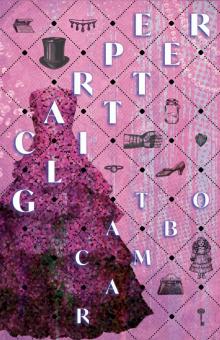 Carpe Glitter
Carpe Glitter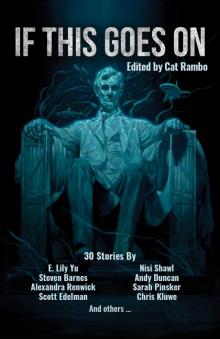 If This Goes On
If This Goes On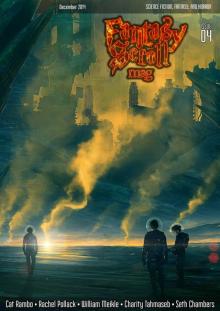 Fantasy Scroll Magazine Issue #4
Fantasy Scroll Magazine Issue #4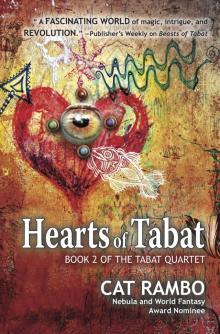 Hearts of Tabat
Hearts of Tabat Beneath Ceaseless Skies #151
Beneath Ceaseless Skies #151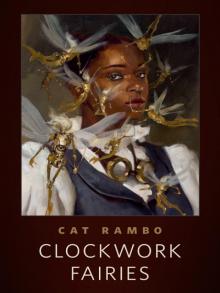 Clockwork Fairies
Clockwork Fairies Beneath Ceaseless Skies #170
Beneath Ceaseless Skies #170 Sugar
Sugar Near + Far
Near + Far Eyes Like Sky And Coal And Moonlight
Eyes Like Sky And Coal And Moonlight